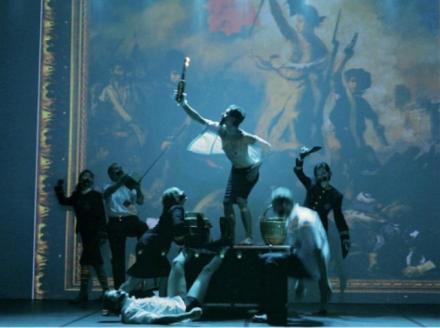Theater was made to push the boundaries, but what happens when your country wants to maintain those artificial limits? One theatre group in Belarus has made a commitment from allowing their home to silence their (powerful) voices.
Belarus Free Theatre is an underground theatre group that operates primarily in secret, holding unofficial rehearsals and free performances in small private apartments, cafes, or wooded areas. Seen as theatrical vigilantes at constant risk of persecution, they constantly change their venues and have no specific theatrical home. Members of the theatre have been attacked by the police and held for their participation in the Belarus Free Theatre activities. The stage director and other associates were fired from their jobs at state-run theatres for their involvement in the movement.
Being Harold Pinter at the mid-April 2007 conference Artist and Citizen: 50 Years of Performing Pinter, in England
The group was established in March 2005 by human rights activist, playwright and journalist, Nikolai Khalezin, and Natalia Koliada, a theatre producer and Khalezin’s wife. The group’s mission was to resist the overwhelming pressure and censorship of Belarus’ president, Alexander Lukashenka.
As the only modern theatre force in the country, the government is challenged by Belarus Free Theatre’s commitment to performing uncensored works. All other theatre is state-run, allowing the country to dictate the programming, resulting in a stale version of theatre which cannot appropriately discuss all aspects of contemporary life. The guerilla theatre group pushes for its creative freedom daily, risking their own security for the promise of truth in art.
Belarus Free Theatre in the short play by Jean-Pierre Thibaudat, one of the 12 featured in ‘Eurepica. Challenge.’
On 22 August 2007, during the Free Theatre’s première of Edward Bond’s theatrical piece Eleven Vests, Belarusian special forces stormed a performance in a private apartment in Minsk, and arrested actors, directors, and audience members. The founder, Khalezin, has now unfortunately become accustomed to these surprises, stating that the police would regularly burst into performances with machine guns in order to demonstrate power. At this point he does not fear for himself, but does notice that it is taking its toll on those who have never been arrested before. He’s afraid that these brave audience members won’t come back. Regardless of the pressure, the show resumed the next day in one of the private houses outside of Minsk. Police took video of the event from the forest.
The next few years were moderately less tumultuous but on December 19, 2010, fifty thousand citizens took to the streets to protest what they believed to be the rigged election of Alexander Lukashenko. More than a thousand of those were beaten and arrested, including Artistic Director Natalia Koliada, along with other artistic figures. At the Belarus Embassy in London, Ian McKellen and a number of leaders from the artistic community protested the arrests, bringing international attention to the issue. Natalia Koliada was released, while Nikolai Khalezin went into hiding, where he remains.
The turmoil has been worth it for those in the ensemble, almost all of whom have served time behind bars. Notable playwrights (Tom Stoppard, Harold Pinter, Václav Havel, and Arthur Kopit) have supported the Free Theatre, with Pinter himself so impressed by their biographical work [Being Harold Pinter] that he gave the troupe rights to perform any of his plays for free.
Image Sources: 1, 2


Wow. This is amazing and inspiring to see people so dedicated to their art.
Inspiration against oppression! It’s good to remember just how privileged we, living in the West, really are…
Isn’t it remarkable? I forget how truly lucky we are to have a true sense of freedom when it comes to artistic expression.